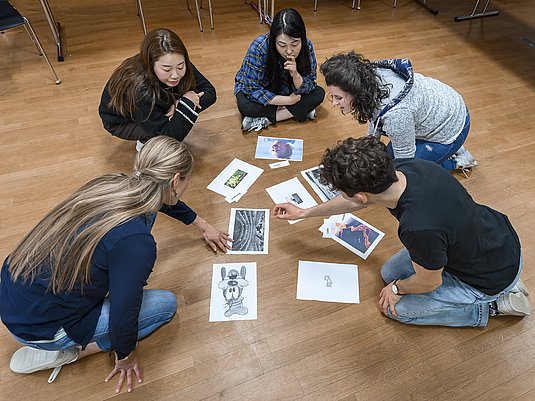Overview for prospective students
Briefly asked
How is the teacher training program structured? Which subjects can I choose? How does the study of the second subject and educational sciences work? How does lateral entry into the music teaching profession work? You can find answers to all these questions on this page.
Teacher training programs
Teaching degree in music for grammar schools and comprehensive schools with a second subject
This degree program consists of a Bachelor of Arts and a Master of Education. The second subject is studied at the University of Cologne.
An overview of the study program
- Degree: Bachelor of Arts | Master of Education
- Standard period of study: 6 semesters | 4 semesters
- Start: Summer and winter semester
- Scope of study: 240 credits | 120 credits
- Possible major subjects: All instruments taught at the university with a focus on classical or jazz/pop, Bağlama, song composition/improvisation/score playing, vocal and instrumental ensemble conducting (classical or jazz/pop), instrumental or electronic composition, songwriting
- Second subject and educational science at the University of Cologne: The combination options with the second subject as well as information on the accompanying educational science course can be found on the University of Cologne website.
- Further study options: after the Bachelor of Arts, in addition to the Master of Education Lehramt für Gymnasien und Gesamtschulen, it is also possible to continue with a Master of Arts, doctorate
Information for first semester students
The University of Cologne's First Semester Navi contains all the information you need about starting your second teaching subject and the educational sciences.
Master's degree in teaching music for grammar schools and comprehensive schools (single-subject course)
This degree program allows students to switch from a Bachelor of Music to a teaching degree and leads to a degree in music as the only teaching subject. It will start in the winter semester 2022/23. Further information on the special requirements can be found below.
An overview of the study program
- Degree: Master of Education
- Standard period of study: 4 semesters
- Start: Winter semester
- Scope of studies: 120 credits
- Educational Sciences at the University of Cologne: The accompanying course in Educational Sciences takes place at the University of Cologne.
Further study options: Doctorate
Information for first semester students
The University of Cologne's First Semester Navi contains all the information you need about starting your second teaching subject and educational sciences.

Versatile study
The teacher training programs feature a broad spectrum of subjects, combining artistic instruction on various instruments and in singing individually and in groups, music theory, and musicology and music pedagogy. Due to the size of the Cologne University of Music and Dance and its stylistically diverse orientation, students are free to explore music of a wide variety of genres in theory and practice. The current range of subjects can be found in the study regulations and in the course catalog.
Both the Bachelor's and Master's programs are offered in cooperation with the University of Cologne, where the second subject is taken. Since the winter semester 2020/21, music can also be studied as a third subject (extension subject). From the winter semester 2022/23, a Master of Education can also be obtained after a Bachelor of Music.
Artistic majors
All instruments taught at the university with a focus on classical or jazz/pop, Bağlama, song composition/improvisation/score playing, vocal and instrumental ensemble conducting (classical or jazz/pop), instrumental or electronic composition, songwriting.
Further information can be found in the aptitude test regulations. Please also see the range of subjects on offer with details of the relevant contact persons (see Downloads).
Contact persons
Do you have questions or need support? Then please contact Prof. Dr. Christine Stöger or the teaching office. You can find the office hours on this page.
Documents & Downloads
